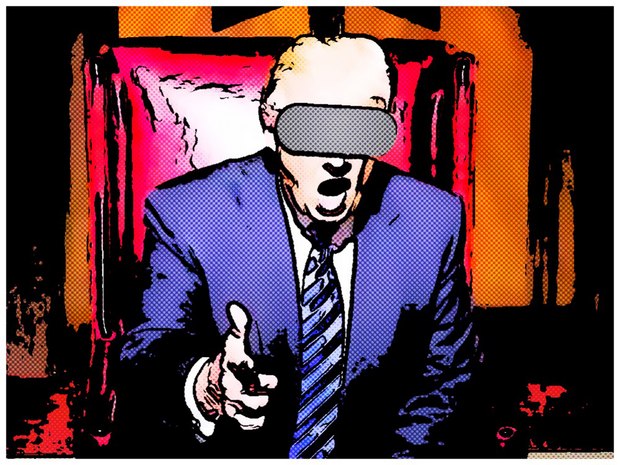In a special report from April 1, 2018, harsh realities spur virtual escapism in a post-truth society.
The harsh realities of Donald Trump’s presidency, including global recession, riots and the enactment of U.S. martial law, have been a boon to the virtual reality industry, which exceeded projections by breaching $444 billion USD in annual revenue in 2017, driven by demand from Trump detractors and supporters alike.
Immersive media analyst Bill Ruse, speaking from his bunker in Berkeley, California, observed, “When Donald Trump took office and the reality of our nation’s predicament hit, even California’s legalization of recreational marijuana wasn’t enough to take the edge off. Something stronger was needed, and virtual reality was the obvious drug of choice. In hindsight, it appears that Palmer Luckey was shrewdly priming the pump with his controversial support of Trump, creating enormous VR demand by seating a tyrannical sociopath in the Oval Office. Now Oculus and the other major VR players are laughing all the way to the bank, while the developers who boycotted Oculus over Palmer’s donations are out of business. Trump senior counselor Steve Bannon’s strategy of providing VR subsidies to distract Americans from the sight of hate crimes and mass immigrant round-ups was a ‘win-win’ for the administration and the tech sector.”
In Marysville, Ohio, Pete Middleton, a former Trump supporter recently laid off from his manufacturing job at the local Honda auto plant, checks the “I win!” box on his poverty level federal tax return while addressing his disillusionment. “When Donald Trump said the Chinese and Mexicans have been laughing at us for years, it rang true. Middleton notes, “Seems like everybody else has been profiting from this ‘globalization’ but us Americans. But when Trump canned the NAFTA thing, our parts stopped coming up from Mexico, the assembly line shut down, and we’re all out of work. Who knew Japanese cars had Mexican engines? When my VR subsidy came in, I spent the first month playing games. My favorite was where you could still buy a tomato for less than $20. Then I moved on to porn, big time. Not proud of it, but I have my demons. These days, I spend my time assembling cars in VR. Reminds me of the old days, sort of.”
Under a new Trump-approved content ratings system consisting of just two classifications - “Fantastic!” or “Disgusting!” - a slew of nostalgic, Mayberry-themed VR apps were produced, but these quickly lost ground to more graphic titles such as the record-breaking release of “GTA: Grand Theft America.” More sordid fare can be found on the dark web, where white rage apps allow VR consumers to catapult Mexicans over the border (into either Mexico or Canada) and even to virtually assault the President’s wife, an activity surprisingly popular with Trump supporters. Related, a VR music video by pro-Trump white supremacist hip-hop group, Tha Puzzy Grabbaz, has gone viral in middle schools across the United States.
Augmented reality hate graffiti has likewise become epidemic, surpassed only by President Trump’s AR name branding and frequent AR tweets. “Trump’s content push really became oppressive after the creation of Trump pop-up blockers was declared an act of treason by the U.S. Supreme Court,” observed Ruse. “It seems like we can’t go twenty minutes without a holographic update on Trump’s ‘fantastic’ horseback ride with Putin, or tweets on how ‘disgusting’ the morning’s security briefing was.”
On the other side of the socio-political fence, VR is being applied to more therapeutic purposes, including the treatment of PESD (post-election stress disorder). VR is also being used to prepare women facing gauntlets of protestors at the few remaining family planning clinics in California, New York, Oregon, Washington, New Hampshire and Vermont, following the U.S. Supreme Court’s repeal of Roe v Wade in 2017.
First Lady Melania Trump did not respond to our requests for an interview, and reportedly spends most waking hours in VR reliving her privileged private life, prior to the political glare of the Trump presidency. Hillary Clinton took a break from a simulated cabinet meeting in her room-scale prison cell to take questions in her virtual Oval Office. The former First Lady and Secretary of State waxed philosophical about the merits of VR. “I'm all thumbs with technology. After the whole email server thing landed me here, you’d think the last thing I’d ever want to do was touch another computer. But to his credit, Attorney General Giuliani argued for clemency from the court in the form of this great HTC Vive setup. My bunkmate Rhonda helped configure it in exchange for a few favors. Now I can enjoy the glory of the White House minus the hassle, and with a pre-Monica, First Gentleman Bill to boot! Cities may be burning, but life is good.”








